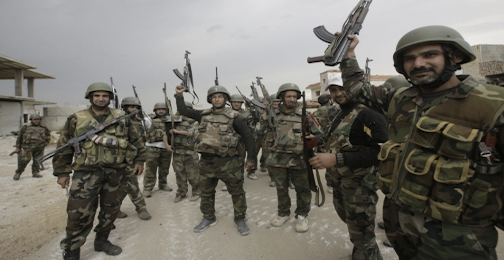Warum Assad in Genf eine starke Position hat
Red. Diesen Beitrag hat Syrien-Spezialist Professor Joshua Landis am 22. Januar für «Aljazeera America» geschrieben.
—
Analysis: Why Syria’s Assad heads to Geneva from a position of strength
His army is stronger, his allies are more committed and regime’s capacity for brutality has kept it in charge.
As representatives of Syria’s Assad regime and some of its opponents sit down Wednesday for their first direct negotiations since the rebellion began three years ago, the grim reality facing the Syrian opposition is this: President Bashar al-Assad comes to the negotiating table in Switzerland apparently stronger today than at any time in the last two years. Thus his cavalier tone ahead of the talks, dismissing opposition representatives as a »joke” and brushing off Secretary of State John Kerry’s and the opposition’s demand that he relinquish power and accept a »transitional governing body.” Instead, Assad maintains, Syria will hold elections this year, and »I see no reason why I shouldn’t stand.”
Understanding why Assad’s regime survives more than two years after then-Secretary of State Hillary Clinton called it a »dead man walking” is critical for gauging the outcome of the Geneva II talks.
The regime’s resilience is based, first and foremost, on the Syrian Army. Without its loyalty, Assad would likely have fallen as quickly as did Tunisia’s President Zine El Abidine Ben Ali and Egypt’s President Hosni Mubarak in 2011. But while many soldiers and officers did join the rebellion, most did so as individuals; few entire units defected and no entire divisions did. Structurally, the military held together, and it was able to replenish its ranks through intensive recruitment among the Alawite minority, where many are loyal to the regime and still more live in mortal fear of sectarian retribution at the hands of the Sunni-led armed rebellion. The same factors allowed the military to expand its capabilities through the paramilitary Popular Committees, often called shabiha. And it has also been able to enlist the support in critical battles of units of the Shia Hezbollah militia from neighboring Lebanon, whose leaders recognize that their own military fortunes depend on maintaining the re-supply lines that the Assad regime has long provided.
Just as important as the military’s loyalty to the regime has been its superior armaments. Even if rebel fighters, who number well in excess of 100,000 by most estimates, outnumber the Syrian Arab Army, in any battle for territory they are often little match for the Syrian Army’s dramatic technological and organizational advantage. Rebel militias have no answer for the artillery, armor and air power of the Syrian military. Perhaps even more importantly, the rebels have no central command. And it is difficult to imagine, today, how the rebels could plausibly overcome these disadvantages.
The fragmentation and radicalization of rebel fighting forces, over whom there is no clear political command, has been the opposition’s greatest weakness. Had a unified political-military command emerged among Syria’s rebels in the first year of the uprising, at the height of optimism over the Arab Spring, the United States and Europeans might well have been persuaded to give direct military backing to the uprising. Today, such hopes have been dashed.
Infighting among rival militias battling for control over rebel-held areas has, in recent weeks, cost over 1,000 lives. The prospect of militia chaos combined with widespread human rights abuses, the radicalization of the militias, and an estimated 10,000 foreigners fighting on the rebel side have spooked Western leaders, even amid the anguish caused by images depicting gruesome torture and murder in the dungeons of the regime.
Few policy-makers talk about »good guys” in Syria anymore; some — most notably former CIA Director Gen. Michael Hayden last December — even argue that a rebel victory would be worse than an Assad win. Not even the recent emergence of a larger militia coalition, the Islamic Front, to organize rebel fighting and challenge forces aligned with Al-Qaeda has been able to end rebel chaos.
Foreign involvement in the Syrian civil war has also worked strongly to the advantage of the regime. Iran and Russia have proven to be far more reliable as allies to Assad than the U.S. and Gulf Arab states have been to the rebels. From day one of the revolt, Assad’s top concern has been that the U.S. would invade. He and his generals were convinced that they could survive so long as F-16s did not appear over the Damascus horizon. So far, their assumption has proven to be correct.
Rhetoric and action gap
Rarely has the gap between U.S. rhetoric and action been wider than it has been on Syria: President Barack Obama proclaimed during the first months of the uprising that »Assad must step aside,” which was read as a statement of intent by the rebels but which has produced negligible concrete action. Even when Washington proclaimed that Assad had crossed Obama’s »red line” by using chemical weapons, no retribution rained down. The U.S. electorate has no appetite for further wars in the Middle East. So, while Obama was able to strike a deal ridding Syria of all WMD, to the opposition that success was a damp squib. They had expected Washington to deal Assad a crippling blow, turning the fight in their favor. Instead, Washington struck a chemical-weapons dealthat saw Assad dispense with a category of weapons that had played very little role in the civil war, while effectively strengthening his and his allies’ diplomatic position.
Obama made clear in his pivot on launching a punitive strike on Syria that he believes the U.S. has practically no interest in the country’s civil war. Syrian opposition figures look at the fact that the U.S. has spent less than $2 billion on Syria, the equivalent of three days’ spending at the height of the Iraq war, and see little reason to expect much from Washington. Even those opposition groups who’ve agreed to go to Geneva II are not convinced by Secretary of State John Kerry’s insistence that Assad will have to agree at the talks to form a sovereign »transitional government.” Kerry took charge of the State Department last year declaring his intention to change Assad’s »calculation” about his ability to hold on to power, but instead it is Washington’s calculations, rather than Assad’s, that have changed. How he will be made to step aside on the basis of the current balance of forces remains a mystery.
Assad has been extraordinarily ruthless in pursuing his survival, and such ruthlessness can have a decisive effect in determining the course of a war. The most recent U.N. report about »industrial scale killing of detainees” made for blood-chilling reading, chronicling the regime’s brutality and willingness to destroy whole neighborhoods in order to kill rebel fighters sheltering within them. The carnage wrought by Assad’s forces has been breathtaking — one in three Syrians today has been displaced from their homes by the war.
Assad’s game plan was to confront unarmed civil disobedience with gunfire, betting that turning the uprising into an armed rebellion would push extremist forces to the fore, which would alienate key Syrian and foreign stakeholders. He prioritized geography, withdrawing from the regions that hold less strategic value or are ungovernable by his regime in order to consolidate his hold on core geographic assets, such as Damascus, Homs, Hama and the highways linking them to the Alawite population centers on the coast. Although he ceded control of the poorest and most heavily Sunni provinces of northern and eastern Syria, his army has been able to retain bases in every major northern city. Government artillery and aircraft continue to bombard rebel-held areas at will, creating chaos and sowing dissention.
So, although Assad’s representatives have gone to the negotiating table in Switzerland, it is not clear they are there to seek compromise. But others might.
While Assad insists that his army is »making progress,” it is not at all clear that he can retake Syria or that Syria’s allies will continue to bankroll his attempt to do so. Iran and Russia may well be content to have the Assad regime survive in only half of Syria if Saudi Arabia, Turkey and the West agree to the other half for the rebels. Even then, a deal remains a distant prospect. Most Syrians today reject the notion of partition or even autonomous regions, but the military stalemate has endured for almost two years. On the eve of the Geneva talks, Syria’s Kurds declared unilateral autonomy in the far northeast, where they hold military power and comprise the majority of the population. Syria is effectively divided, and none of the military forces in the field appear capable of reuniting it under their control. Negotiated settlements to end wars tend to reflect the balance of forces in play; the idea of Assad stepping aside for a consensus-based national unity government is quite at odds with the current balance of geopolitical and military forces. For that reason, it is unlikely to be achieved at Geneva II.
—
The post by Joshua Landis appeared first on Syria Comment.
—
Siehe
Erich Gysling: «Syrienkonferenz: Der Ansatz ist falsch!» vom 25.1.2014
—
Themenbezogene Interessenbindung der Autorin/des Autors
Joshua Landis ist Professor für Internationale Beziehungen und Direktor des «Center for Middle East Studies» an der University Oklahoma, USA. Landis spricht fliessend Arabisch, Französisch und Englisch. Seine Familie lebte zuerst in Saudiarabien und im Libanon.









